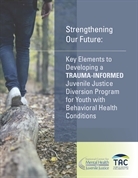Research is helping to establish approaches and programs that effectively change delinquent behavior, lower recidivism and help young people succeed. Evidence-based programs like Multisystemic Therapy and Family Functional Therapy have been found to produce consistently better results than traditional juvenile justice interventions. Many juvenile justice systems struggle to implement scientifically supported approaches, however. Despite proven effectiveness, less than ten percent of youth are afforded evidence-based community services.
Models for Change worked to expand the use and availability of evidenced-based services through intensive investment in reforming Louisiana’s juvenile justice system. Through a combination of local, state, academic and national partnerships, Louisiana adopted a model that doubled the overall proportion of youth able to access evidence-based services, while at the same time witnessing a 46 percent drop in juvenile arrests between 2006 and 2010.
Models for Change promoted innovative services proven to change behavior and improve outcomes for youth.
Featured publications
Initiative tools, research, knowledge, and innovations to promote reform
-
 Strengthening Our Future: Key Elements to Developing a Trauma-Informed Juvenile Justice Diversion Program
Strengthening Our Future: Key Elements to Developing a Trauma-Informed Juvenile Justice Diversion Program
- Dec 11, 2018, NCJJMH
- Diverting youth from the juvenile justice system to effective community-based services and supports will require systems that recognize and respond to trauma-related disorders. These include the…
-
 Innovation Brief: Model for Effective Implementation of Evidence-Based Practices
Innovation Brief: Model for Effective Implementation of Evidence-Based Practices
- Dec 12, 2013, Stephen Phillippi
- In current literature, there is a general agreement concerning what works and what does not work in reducing delinquent behavior with juvenile offenders in communities; however, this knowledge has…
-
 Measuring Success: A Guide to Becoming an Evidence-Based Practice
Measuring Success: A Guide to Becoming an Evidence-Based Practice
- Apr 22, 2013, Jennifer Fratello
- As part of the MacArthur Foundation Models for Change initiative, the Vera Institute of Justice created this guide, which describes the process that assesses whether a program qualifies as evidence…
-
 Probation Review Implementation: How Best Practices Meet Everyday Practices
Probation Review Implementation: How Best Practices Meet Everyday Practices
- Nov 15, 2013, Dr. John S. Ryals
- Through support from the John D. and Catherine T. MacArthur Foundation and the Robert F. Kennedy Children’s Action Corps, Jefferson Parish, Louisiana undertook a comprehensive Probation Review…
-
 Evidence-Based Practice Recommendations for Juvenile Drug Courts
Evidence-Based Practice Recommendations for Juvenile Drug Courts
- Jul 1, 2009, Holly Hills
- This guide provides a series of recommendations for juvenile drug courts along three critical areas—screening and assessment (Chapter 2), treatment (Chapter 3), and outcome monitoring (Chapter…
More publications »